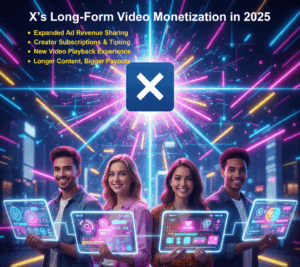What the New European Union Regulations Mean for Artificial Intelligence-Powered Social Media Algorithms in 2025

What the New European Union Regulations Mean for Artificial Intelligence-Powered Social Media Algorithms in 2025
The manner in which we consume material, connect with companies, and find new voices online has been significantly influenced by artificial intelligence, which has become the driving force behind digital platforms such as social media. However, a significant deal of responsibility comes along with this authority. As one of the most ambitious initiatives to govern how information is selected and disseminated across digital platforms, the European Union has presented new legislation targeting AI-driven social media algorithms in the year 2025. These regulations aimed to regulate how material is distributed across digital platforms.
The purpose of these guidelines is to improve transparency, safeguard users, and provide a more equitable digital environment; yet, they also bring up significant concerns about freedom of speech, innovation, and the responsibility of platforms.
Why the European Union Is Focusing on Artificial Intelligence Algorithms
The “For You” tab on TikTok, the Reels feature on Instagram, and the Shorts suggestions on YouTube are all examples of large social platforms that rely heavily on artificial intelligence algorithms. With the help of these algorithms,
Which videos are the most popular?
Currently trending news stories
How many different goods are advertised in feeds?
Nevertheless, there is a growing fear that these platforms have the potential to disseminate false information, magnify bad material, and create echo chambers. Policymakers in the European Union are of the opinion that additional protections are required in order to prevent people from being manipulated, biased, and influenced in a covert manner.
Principal Characteristics of the New Regulations
This new framework from the European Union (EU) includes a number of ground-breaking rules for platforms that depend significantly on recommendation algorithms that are based on artificial intelligence.
1. The Transparency of Algorithms
In words that are easier for consumers to comprehend, platforms are obligated to describe the operating mechanism of their recommendation engines. Included in this is the explanation of the reason why a certain video, advertisement, or message is shown on someone’s feed.
2. The Control and Choice of the User
Users need to be provided with the option to disable customized suggestions inside the system. On the other hand, customers have the option of selecting a chronological feed or other transparent sorting techniques, which offers them more control over their own digital experience.
3. Restrictions Applying to Private Information
It is currently against the law for artificial intelligence algorithms to make use of sensitive categories for the sake of targeting or making recommendations. These categories include religion, political opinions, and sexual orientation.
4. Increased restrictions on the use of moderation
Platforms are expected to do frequent risk assessments in order to discover the ways in which their algorithms may distribute harmful material or potentially misleading information, and they are also obligated to take remedial actions.
5. Accountability and Financial Penalties
Companies in the technology industry are compelled to take compliance seriously since failure to comply with these laws may result in substantial penalties. Failure to comply comes with financial and reputational ramifications.
How This Affects Different Platforms for Social Media
The new regulations will have a substantial impact on the way big platforms in Europe conduct their business.
- Parts of the recommendation algorithms that are powered by artificial intelligence will need to be redesigned for TikTok, Instagram, and YouTube.
- Platforms that are smaller in size encounter difficulties due to the fact that compliance demands resources that are more readily accessible to bigger businesses.
- Because hyper-personalized targeting is becoming increasingly constrained, there is a possibility that advertising models may evolve.
Influence on Commercial Activities and Marketers
Both possibilities and difficulties are presented to brands as a result of these restrictions.
- Less Reliance on Algorithm Boosts: In order to reach audiences, businesses cannot rely entirely on virality that is powered by artificial intelligence. It’s possible that they need to increase their investments in organic communities and direct community development.
- An increase in transparency will allow marketers to obtain insights into the process of prioritizing content, which will assist them in refining campaigns in a more ethical manner.
- It is necessary for businesses to diversify their content by disseminating it over a number of different platforms rather than concentrating more on a single algorithm-driven application.
Users Should Know What It Means
- The modifications are intended to make the online experience safer and more balanced for people who use the internet on a regular basis.
- As an alternative to being forced to rely on algorithmic suggestions, users have the ability to choose the manner in which their feeds are curated.
- A reduction in the likelihood of political or ideological manipulation may be achieved by restricting the targeting of sensitive data.
- The implementation of transparency rules has the potential to reestablish some level of confidence in platforms that have been chastised for engaging in covert activities.
A More Comprehensive Perspective: Establishing a Global Standard
As seen by the General Data Protection Regulation (GDPR), the European Union has a long history of establishing digital regulatory precedents. It is possible that these AI-focused guidelines may motivate other areas to implement legislation that are comparable, which would force global platforms to reevaluate their algorithmic methods around the globe.
While officials in the United States, Canada, and some regions of Asia are observing how the European Union (EU) executes these reforms, arguments in these regions are already gaining speed.
Criticism and Obstacles to Growth
- Critics make note of a few possible drawbacks, despite the fact that many people praise the new rules:
- There is a possibility that smaller firms may have difficulty meeting the stringent standards, which might possibly lead to a reduction in innovation.
- Unnecessary limits might discourage innovation in content discovery and tailoring, which is a risk associated with excessive regulation.
- One of the unintended consequences is that some people are concerned that restricting customization might result in a decrease in user engagement or a social experience that is less dynamic.
The new artificial intelligence standards that have been implemented by the European Union represent the beginning of a new age of algorithm responsibility. Despite the fact that the implementation may cause platforms, organizations, and artists to experience growing pains, it really marks a courageous effort to strike a balance between innovation and user security. In the years to come, the true test will be conducted to determine whether or not these regulations are successful in reducing damages without removing the dynamic and creative energy that is responsible for the success of social media. One thing is certain: the manner in which we engage with material that is powered by artificial intelligence will never again be the same.







